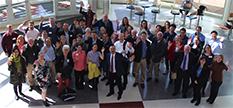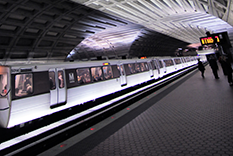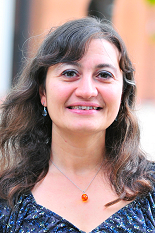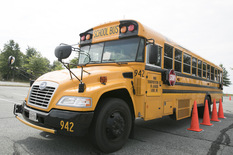News Story
Transportation@Maryland Workshop Promotes Multi-Disciplinary Collaboration on Future Mobility Systems

Click here to enlarge the image.
Forty-two faculty and staff from 10 University of Maryland (UMD) colleges and 15 research centers took the first step on April 3 toward a campus-wide research initiative to tackle the nation’s pressing transportation issues.
Hosted by the National Transportation Center (NTC@Maryland), the workshop provided an opportunity for experts in engineering, planning, social and behavioral sciences, business and logistics, information and data sciences, arts and humanities, public policy, public health, computer and mathematical sciences, and journalism to discuss research expertise, share information on activities and opportunities, and begin to craft strategies for standing up a Transportation@Maryland research network.
“Multidisciplinary expertise and established leadership in several key transportation research areas, along with close partnerships with state and federal agencies, leaves us uniquely positioned to turn the University of Maryland into a test bed for transportation innovation,” said Charles Schwartz, professor and chair of the Department of Civil and Environmental Engineering and one of the workshop participants.
Robert Briber, associate dean for research in the A. James Clark School of Engineering, welcomed workshop participates in a packed Pepco Boardroom in the Kim Building. Opening remarks were offered by Mariah Bauer, director of strategic initiatives and planning for the Office of the Provost, as well as Eric Chapman and Erin Fitzgerald from the Office of the Vice President for Research.
Attendees also included representatives from the Office of Corporate and Foundational Relations and directors and co-directors of 15 transportation-related research, education, and outreach centers across campus.
The half-day event began with lightning talks from researchers working on a broad range of transportation issues.
“Everyone at the workshop showed great enthusiasm about this proposed multidisciplinary initiative,” said Lei Zhang, director of NTC@Maryland and the organizer of the workshop. “Our collective goal is to establish and strengthen UMD as a world leader in emerging interdisciplinary research areas such as transportation big data and data analytics, cybersecurity for connected and automated vehicles, shared mobility, freight and logistics, social and behavioral research for future mobility systems, and innovative infrastructure policy. We cannot achieve this goal without effective collaboration across colleges.”
The workshop continued with networking and breakout sessions where participants discussed the challenges of working across disciplines and methods for overcoming them. Groups also explored opportunities for collaboration and discussed investment priorities to promote long-term collaboration.
Immediate next steps include developing a Transportation@Maryland website, forming an email list, establishing a regular seminar series, and building mechanisms and support for joint research across multiple colleges that target existing and upcoming major external funding opportunities. A workshop summary report with information on individual and center attendees and their expertise as well as discussion outcomes will be made available to the campus community through the new Transportation@Maryland email list.
UMD staff and faculty can join the burgeoning network by sending an email to lei@umd.edu.
“We welcome everyone at UMD with an interest in transportation-related issues to join Transportation@Maryland,” emphasized Zhang.
UMD is home to the largest transportation data and data analytics center in the U.S., with more than 8,000 data partners and users, including federal, state, and local agencies across all 50 states and D.C. and companies such as Google and Waze. UMD is also one of only five universities competitively selected by the U.S. Department of Transportation to lead a National Transportation Center and one of only three universities competitively selected by the U.S. Department of Energy to lead its TRANSNET Smart Mobility Initiative.
Published April 12, 2017








